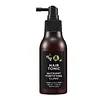What's inside
What's inside
 Key Ingredients
Key Ingredients

 Benefits
Benefits

 Concerns
Concerns

 Ingredients Side-by-side
Ingredients Side-by-side

Water
Skin ConditioningAlcohol Denat.
AntimicrobialMenthol
MaskingTromethamine
BufferingSalicylic Acid
MaskingPanthenol
Skin ConditioningBiotin
AntiseborrhoeicButylene Glycol
HumectantMentha Piperita Leaf Extract
Skin ConditioningMentha Viridis Extract
MaskingMentha Rotundifolia Leaf Extract
TonicGlycine Max Seed Extract
Skin ConditioningNigella Sativa Seed Extract
PerfumingOryza Sativa Extract
AbsorbentRibes Nigrum Fruit Extract
AstringentSesamum Indicum Sprout Extract
HumectantSalvia Hispanica Seed Extract
EmollientVaccinium Angustifolium Fruit Extract
Skin ProtectingHydrolyzed Centella Asiatica Extract
AntioxidantMadecassoside
AntioxidantMadecassic Acid
Skin ConditioningAsiaticoside
AntioxidantAsiatic Acid
Skin ConditioningCamellia Sinensis Leaf Extract
AntimicrobialHouttuynia Cordata Extract
Skin ConditioningLeonurus Sibiricus Flower/Leaf/Stem Extract
SoothingNelumbo Nucifera Flower Extract
Skin ConditioningArtemisia Vulgaris Extract
Skin Conditioning1,2-Hexanediol
Skin ConditioningEthylhexylglycerin
Skin ConditioningCaprylyl Glycol
EmollientParfum
MaskingWater, Alcohol Denat., Menthol, Tromethamine, Salicylic Acid, Panthenol, Biotin, Butylene Glycol, Mentha Piperita Leaf Extract, Mentha Viridis Extract, Mentha Rotundifolia Leaf Extract, Glycine Max Seed Extract, Nigella Sativa Seed Extract, Oryza Sativa Extract, Ribes Nigrum Fruit Extract, Sesamum Indicum Sprout Extract, Salvia Hispanica Seed Extract, Vaccinium Angustifolium Fruit Extract, Hydrolyzed Centella Asiatica Extract, Madecassoside, Madecassic Acid, Asiaticoside, Asiatic Acid, Camellia Sinensis Leaf Extract, Houttuynia Cordata Extract, Leonurus Sibiricus Flower/Leaf/Stem Extract, Nelumbo Nucifera Flower Extract, Artemisia Vulgaris Extract, 1,2-Hexanediol, Ethylhexylglycerin, Caprylyl Glycol, Parfum
 Reviews
Reviews

Alternatives
Ingredients Explained
These ingredients are found in both products.
Ingredients higher up in an ingredient list are typically present in a larger amount.
Houttuynia Cordata Extract is more commonly known as Heart Leaf, Fish Mint, or Chameleon plant.
The components found in Heart Leaf give it antioxidant, hydrating, antimicrobial, and anti-inflammatory properties.
Heart Leaf is rich in flavonoids such as quercetin, apigenin, and more. It also contains polysaccharides, the most common type of carbs in food.
Flavonoids have been shown to be effective antioxidants. They help neutralize free-radical molecules. Free-radical molecules are unstable molecules that may damage our skin cells and DNA. The flavonoids in Heart Leaf also help soothe the skin.
Polysaccharides are naturally found in our skin. They play a role in hydrating and repairing the top layer of skin. The polysaccharides in Heart Leaf help moisturize our skin.
Studies show decanoyl acetaldehyde, a component of Heart Leaf oil, is effective at killing bacteria.
The name 'Fish Mint' comes from the herb's natural fishy smell. Is is native to southeast Asia and used throughout the continent for traditional cooking and medicine.
Learn more about Houttuynia Cordata ExtractMenthol is a compound found in mint plants, such as peppermint. In its pure form, it is a clear crystalline substance.
Menthol is known for its cooling sensation; however, the cooling is actually from your skin being sensitized. Menthol can worsen rosacea. We recommend speaking with a professional if you have concerns.
Menthol also has antimicrobial properties.
Learn more about MentholPanthenol is a common ingredient that helps hydrate and soothe the skin. It is found naturally in our skin and hair.
There are two forms of panthenol: D and L.
D-panthenol is also known as dexpanthenol. Most cosmetics use dexpanthenol or a mixture of D and L-panthenol.
Panthenol is famous due to its ability to go deeper into the skin's layers. Using this ingredient has numerous pros (and no cons):
Like hyaluronic acid, panthenol is a humectant. Humectants are able to bind and hold large amounts of water to keep skin hydrated.
This ingredient works well for wound healing. It works by increasing tissue in the wound and helps close open wounds.
Once oxidized, panthenol converts to pantothenic acid. Panthothenic acid is found in all living cells.
This ingredient is also referred to as pro-vitamin B5.
Learn more about PanthenolSalicylic Acid (also known as beta hydroxy acid or BHA) is a well-known ingredient for treating skin that struggles with acne and clogged pores. It exfoliates both the skin's surface and deep within the pores to help clear out buildup, control oil, and reduce inflammation.
Unlike AHAs (alpha hydroxy acids), salicylic acid is oil-soluble. This allows it to penetrate into pores which makes it especially effective for treating blackheads and preventing future breakouts.
Salicylic acid is also known for its soothing properties. It has a similar structure to aspirin and can calm inflamed or irritated skin, making it a good option for acne-prone skin that is also sensitive.
Concentrations of 0.5-2% are recognized by the U.S. FDA as an over-the-counter topical acne product.
It can cause irritation and/or dryness if one's skin already has a compromised moisture barrier, so it's best to focus on repairing that before introducing this ingredient into your routine.
While salicylic acid does not increase sun sensitivity, it’s still important to wear sunscreen daily to protect your skin.
If you are looking for the ingredient called BHA or Butylated Hydroxyanisole, click here.
Learn more about Salicylic Acid